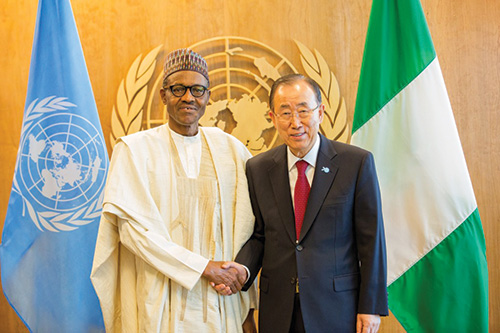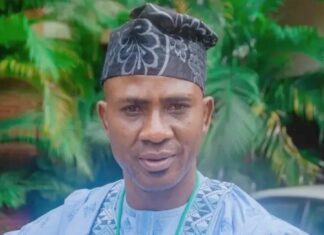The 70th United Nations General Assembly witnessed a promising resolve by global leaders to wipe out terrorism around the world by leveraging on collective strategies, even as individual member’s interests dictated the tone of discourses. Correspondent, SAM NWOKORO, reports.
The United Nations General Assembly (UNGA or GA) that ended last week with global leaders renewing their commitments to end global terrorism which has in most parts of the world adversely affected effective implementation of the Millennium Development Goals (MDGs). The issue of ending global terror was addressed by many heads of government in attendance in the general floor and at various sideline meetings.
Another issue that featured at the UN General Assembly, which held between late September and early October was progress reports on the state of the world’s development, precisely the MDG which started from year 2000. The first phase of the agenda ended in September 2015. The MDG as it was known is made up of eight points, being mandates to halve poverty in member states via various economic stimulus packages that touch on the critical mass of their populations, irrespective of political systems and ideological leanings of incumbent political authorities.
The eight points mandates include: eradication of the main six child killer diseases (cholera, polio, tuberculosis, tetanus, diarrhoea and dysentery), improving the status of maternal/child care, education, eradication of HIV/AIDS, provision of mass shelter, improvement of healthcare services to majority of people, human rights adoptions all over the world according to UN charters, environmental preservation, food availability and rule of law. In 2012, “inclusive growth”, as an economic policy prescription, was added to the list, with the hope of moderating the gap in material and social comfort between the urban rich and the rural or sub-urban poor. Most of these issues featured in the latest UNGA addresses on both the floor and various sideline meets.
Agency reports also have it that the next phase of the MDG agenda dubbed Sustainable Development Goals (SDGs), a sort of follow-up action on progress in MDG executions, was discussed. It envisages to eradicate poverty in all parts of the world by 2030. This year’s GA was well attended by virtually all the leaders of the world’s main blocs: the G7 leaders, the members of the UN Security Council (United States, Britain, France, China and Russia), as well as regional heads and all representatives of international organisations. Perhaps due to the obvious danger terrorism poses to development efforts of member states, there was consensus on many fronts and resolves of key anti-terror allies to pull strategies together to tackle the scourge, so that it does not threaten development in the manner it has in the last 15 years of MDG implementation.
The attendance of U.S. President Barak Obama and his obvious presence in several of the sideline meetings, coupled with his evocative address to the UN, gave the impression that Washington, notwithstanding mainstream Republican Party apostles that his administration has been sleek in dealing with global terror, would not want to be off-beat on issues of global security. With his tenure expiring in less than a year, and the GOP positioning Rambo presidential hopefuls who traditionally take hard bites on global terror, it was expedient for Obama to pass the message to key anti-terror allies and the home audience that his modest contribution in the terrorism war is substantial enough to give any Democrat hopeful and supporters a winning edge, at least as an addition to his superlative domestic accomplishments, for example the healthcare reforms.
At Global Leaders’ Summit
President Muhammadu Buhari was at one of the sideline meetings which had Obama and other key allies in attendance. He also addressed the GA.
During the Global Leaders’ Summit, one of the major sideline summits in which the president sat with Obama and key anti-terror allies, Buhari said that military option was not enough to defeat the Islamic State of Iraq and Levant (ISIL), Boko Haram and other extremist organisations, arguing that the UN and the international community need to do more.
“We need to take military action combined with effective border security, intelligence collection and sharing, and vigorous policing action,” Buhari said, urging the world leaders to address the threat from the source.
Buhari confirmed popular perception that the UNGA was actually a parliament with uncensored immunity for anyone aggrieved to voice out his grievance. U.S. voiced concern over poor intelligence coordination among nations contending with terror plagues in the Maghreb regions and parts of West Africa. Western Europe was scared of terrorism reaching its soil after the Charlie Hebdo attack in Paris early in the year and showed more readiness to co-operate more than before since the formation of European economic integration via the Maastrich Treaty of 1992 that Brussels was now willing to help developing African nations in the fight against terror. But that, to a large extent, would depend on the individual country’s priority nations to help.
Forging consensus among allies appeared to be Washington’s concern as garnered in the discussions of the Global Leaders’ Summit, the major summit among other sideline summits, because of the importance on global security during the summit. Washington stepped up negotiations to get Iran play closer role in supporting Western allies in implementing UNSC resolutions adopted during the August meeting on how to stem arms flow in the Iraq/Syria crisis.
The UNSC had during its deliberation chaired by Nigeria’s representative at the UN, Prof. Joy Ogwu, ruled as follows: “On Iraq/Syria crisis, the UNSC adopted Resolution 2170 made in 2014 condemning gross widespread abuse of human rights by extremist groups in Iraq and Syria since their crisis started.
“Calling on all UN member states to act to suppress the flow of foreign fighters, financing and other supports to Islamist extremist groups in Iraq and Syria, the security…put six persons affiliated to these groups on its terrorists sanctions list. Through unanimous adoption of Resolution 2170 (2014) under the binding Chapter VII of the United Nations Charter, the council condemns in the strongest terms what it calls gross systematic and widespread abuse of human rights by ISIL, also known as ISIS and the Al-Nusra Front.”
Watchers of global affairs foresee in the near future a breakthrough by the western allies.
The decision by Washington earlier on to agree to UN easing of sanctions against Iranian crude oil exports to allow the country sell some 500,000 barrels per day in the international market is seen as a broader strategy to win the heart of authorities in Tehran to help accelerate the effectiveness of UN’s several resolutions against the terror groups in Middle East, especially in the control of arms flow and foreign fighters since Tehran also harbour a significantly increasing number of Al-Qaeda, ISIS and Al-Nusra sympathisers who ferry logistic support to the jihadists.
Iran had been under crude export embargo imposed by UN since nearly a decade now for failing UN and International Atomic Agency verification tests on Iran’s alleged deviation from earlier agreement not to venture into development of nuclear weapons. Under former Iranian president, Ali Akbar Hashemi Rafsanjani, nuclear development project was dubbed for peaceful purpose and for industrial development, especially electricity. But series of site inspection amid years of hide-and-seek led to discoveries that Tehran had gone deep in developing nuclear and biological weapons. As hardship bite on Iranians due to the embargo, the current leadership in Tehran had been pushing for easing of sanctions.
Washington and her key allies felt that Tehran is still a bit far from full deployment of nuclear missile and thus yielded to the easing of sanctions. There is the calculation that an improved oil revenue income in the coffers of Iran would stem terror flows around the region and also even ease reported slowdown in crude production in the west, and reduce the rate of shale production with its environmentally-noxious chloroflurocarbon emissions at a time the UN is talking about environmental remediation, sustainable development and climate change agenda. Thus it made handsome sense to key Iran into any worthwhile anti-terror strategy by allowing her export crude.
Security, the Buharispeak
President Buhar spoke candidly on security as it concerns the country, and his preferred economic development model in his change agenda. Addressing the GA, he said: “The world must find a way to prevent young people from turning to terror. Member states need to address local socio-economic grievances by formulating policies that would ensure broad-based transformation through job creation, equalisation of opportunities and expanding access to social services.”
This is largely responsible for much of the jihadist movements in Nigeria, west and Magreb regions of Africa without necessarily mentioning names, he added and called for effective information sharing in the fight against global terror.
By hindsight, it could be observed that Buhari’s domestic policies, though most of them are still in form of blueprints, seek to make economic participation as inclusive as he expects those who had not been strongly connected to economic levers in the various sectors have a fair chance of keying in.
The nation’s security institution is on massive recruitment to fill in gaps created by the waves of retirement when the new government took over: some 10,000 vacancies have been declared for the police.
There is talk of delaying the advocated petrol subsidy removal until the local refineries are completely refurbished to meet their various installed capacities. It has also been reported that licences have been given to some entities, yet to be publicly disclosed, to construct modular refineries that do not necessarily have to take eternity to come on stream.













